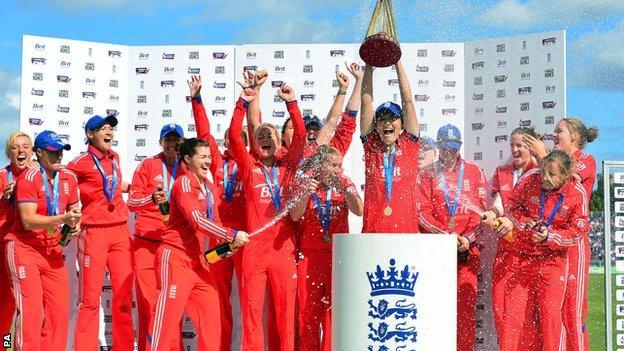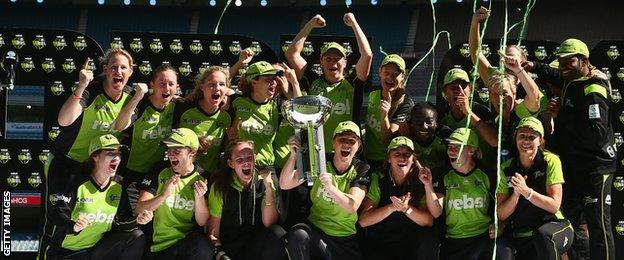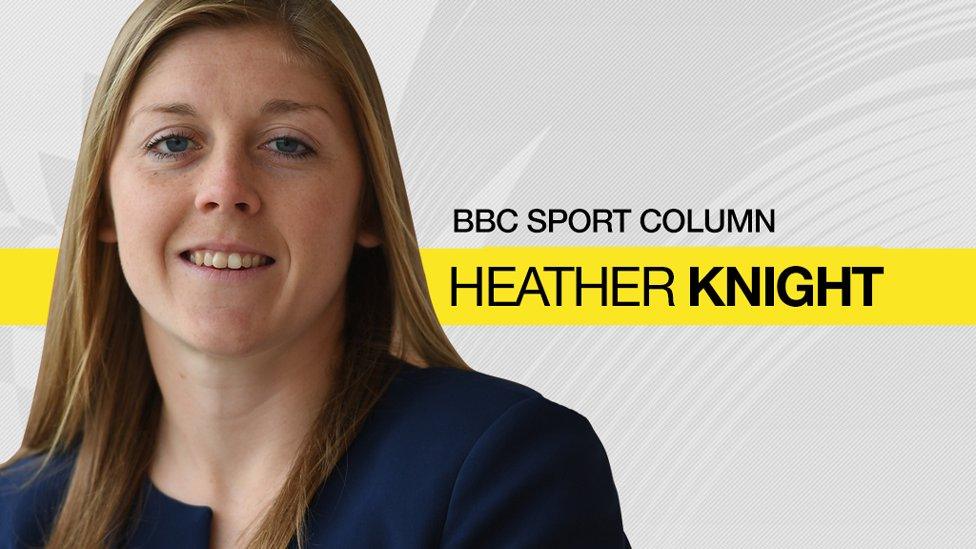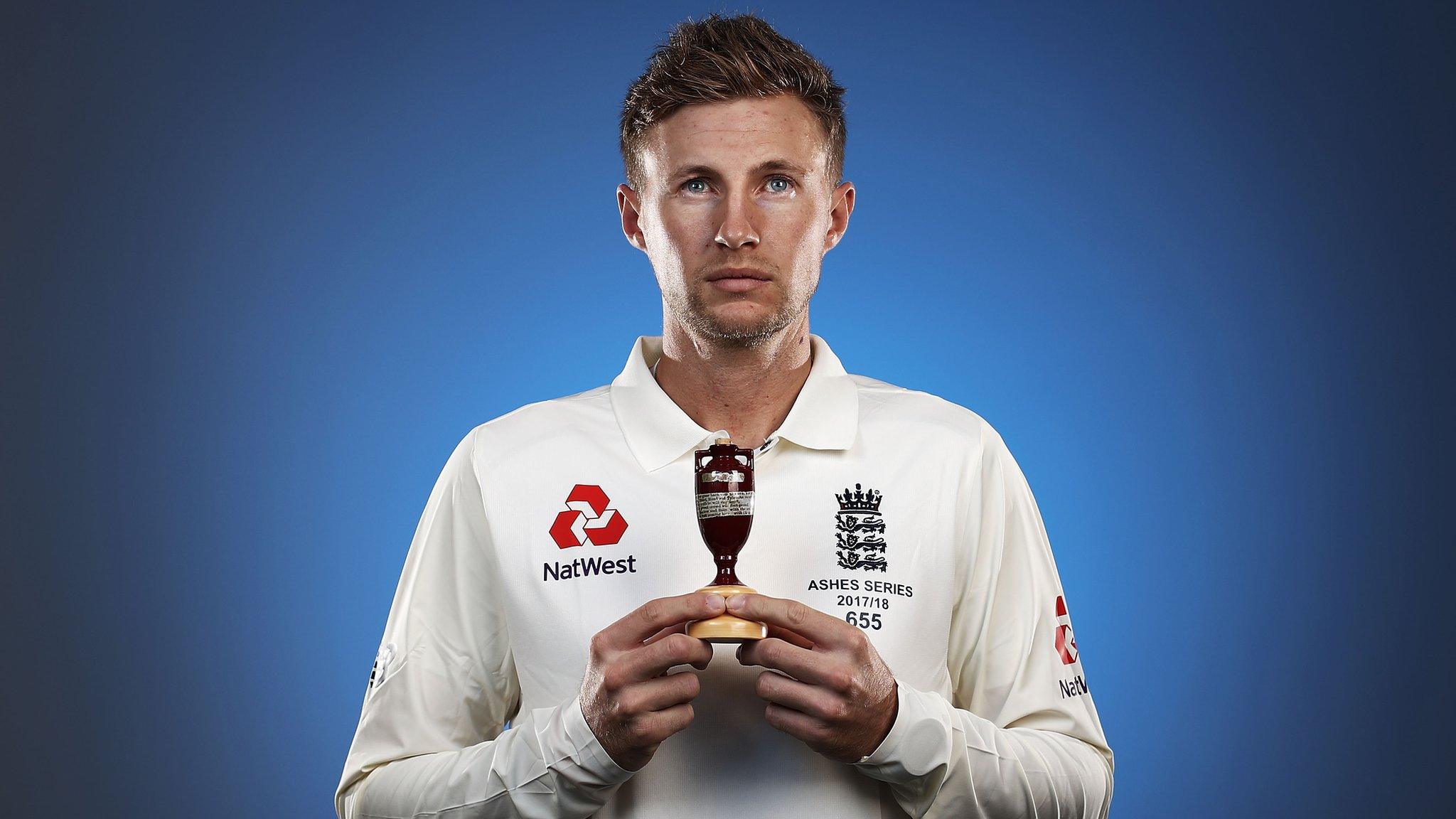Super League: Franchise cricket gets set for launch in England
- Published
Super League's six of the best
Kia Super League |
|---|
Group stage: 30 July-14 August Finals Day: 21 August (Chelmsford) |
Coverage: BBC Test Match Special commentary on seven group games, plus Finals Day; additional coverage on BBC local radio |
Franchise cricket has finally arrived in England - and it is the women leading the way.
While a long, drawn-out debate continues over whether English men's Twenty20 cricket should move to a city-based competition, external, the women's Super League will launch on Saturday with six teams.
Lancashire Thunder, Loughborough Lightning, Southern Vipers, Surrey Stars, Western Storm and Yorkshire Diamonds are all seeking to reach Finals Day on Sunday 21 August - and each side will be bolstered by three overseas signings.
It is not the first time the country's female cricketers have blazed a trail - this summer the England men's team have played Sri Lanka and Pakistan in a 'Super Series' with points awarded across all three formats, an idea first introduced for the 2013 Women's Ashes.
And with the England and Wales Cricket Board (ECB) said to be at an advanced stage of discussions to revolutionise the domestic men's T20 game, they will be keeping a keen eye on whether or not the women's Super League succeeds.
Why the Super League was formed

England won the Ashes in 2013 and 2014 but lost to Australia on home soil in 2015
In 2014, the England women's team became the first full-time professional female cricket side, following back-to-back Ashes victories over Australia.
However, the domestic women's game remained amateur and the gap between the players within the professional set-up and those looking to break through widened.
Following a comprehensive Ashes defeat in England last year, questions were asked about the depth of England's talent pool and whether the decision to 'go pro' was the right move.
Director of women's cicket Clare Connor, who led an internal review of the women's domestic competitions between November 2014 and February 2015, felt the ECB had no choice.
"Lots of things were done the wrong way round," Connor admitted. "However, we had a group of around 20 players and we were asking for 100 days a year minimum from them when they were away from jobs, friends and family.
"The difference with the men's game is that they have an underlying professional game. We had to pay them, to support them to get better.
"The internal review concluded that a competition, with fewer players in it than in the women's county game [around 300], was needed to bridge the gap between women's county cricket and international cricket and the Super League was approved by the ECB Board in July 2015."
Star appeal
Women's Super League on BBC Breakfast
Alongside 20 England internationals, the Super League will feature 18 international stars, including big-hitting West Indies batter Deandra Dottin, Australia strike bowler Rene Farrell and South Africa all-rounder Dane van Niekerk.
Unfortunately, England wicketkeeper Sarah Taylor will not feature after deciding to take an indefinite break from cricket, while Australia skipper Meg Lanning was forced to pull out with a shoulder injury.
But former England captain Charlotte Edwards and Kent team-mate Lydia Greenway, both recently retired from international cricket, will feature for the Southern Vipers.
Western Storm include England's captain and vice-captain Heather Knight and Anya Shrubsole, while opener Lauren Winfield and pace bowler Katherine Brunt head the Yorkshire Diamonds squad.
"It's a brilliant opportunity for women's cricket in England to showcase the talent not only from our country, but also the best players from across the world who are coming over to play," Greenway told BBC Sport.
"We have seen how much the Australian players have improved on the back of the Women's Big Bash League (WBBL). Their domestic set-up is ahead of England at the moment, so this will hopefully give England a bigger and better pool of players to pick from."
Can it rival the Women's Big Bash League?

Sydney Thunder beat Sydney Sixers to win the inaugural Women's Big Bash League
Australia's WBBL enjoyed huge success in its first season and it will take time for the Super League to reach a similar level.
The women's Big Bash matches were aired on free-to-air television in Australia, attracting an average audience of 142,000, while the final between the two Sydney teams - Thunder and Sixers - attracted an average metropolitan audience of 257,000.
With no televised matches and a schedule that sees the tournament coincide with the Rio Olympics, the Super League may well fly under the radar.
Surrey's director of women's cricket Ebony Rainford-Brent warned against comparisons and said the focus of this year's competition was to improve the quality of cricket being played.
"Women's cricket is not yet commercially viable at the domestic level and it is not going to compete with the Olympics for a long time," the former England batter said.
"We need to know that we are capable, in the right environment, of increasing the professionalism of the game and putting in a structure so the performances of [Surrey's] players up allowing us to give [England head coach] Mark Robinson more high quality players to pick from.
"This is the seeding-in and we need to be realistic about our expectations regarding exposure."
Expanding horizons for younger players

Young girls were invited to be a part of the Super League launch in Manchester
With one of the main aims of the Super League being to bridge the gap between the England players and the county game, paid professional-level training has been a real eye-opener for some.
Most county teams train once a week, although with many of the players either in full-time education or work, attendance is not mandatory - meaning many may play matches without having trained at all.
"When I came back from Australia [in the winter], the one thing spoke with the ECB was that if we were going to introduce a Super League the biggest benefit would be around training cultures and environments," Edwards explained.
"The training is the most important aspect for me. We had 22 girls training at a professional level and then we had county cricket which was amateur.
"So often in the past people's performances in county cricket have not been recognised as they should have been because of the standard they are playing at.
"There is a great deal of excitement for the county players because they have a next step to aspire to."
- Published27 July 2016

- Published15 May 2018

- Published10 March 2019

- Published18 October 2019
